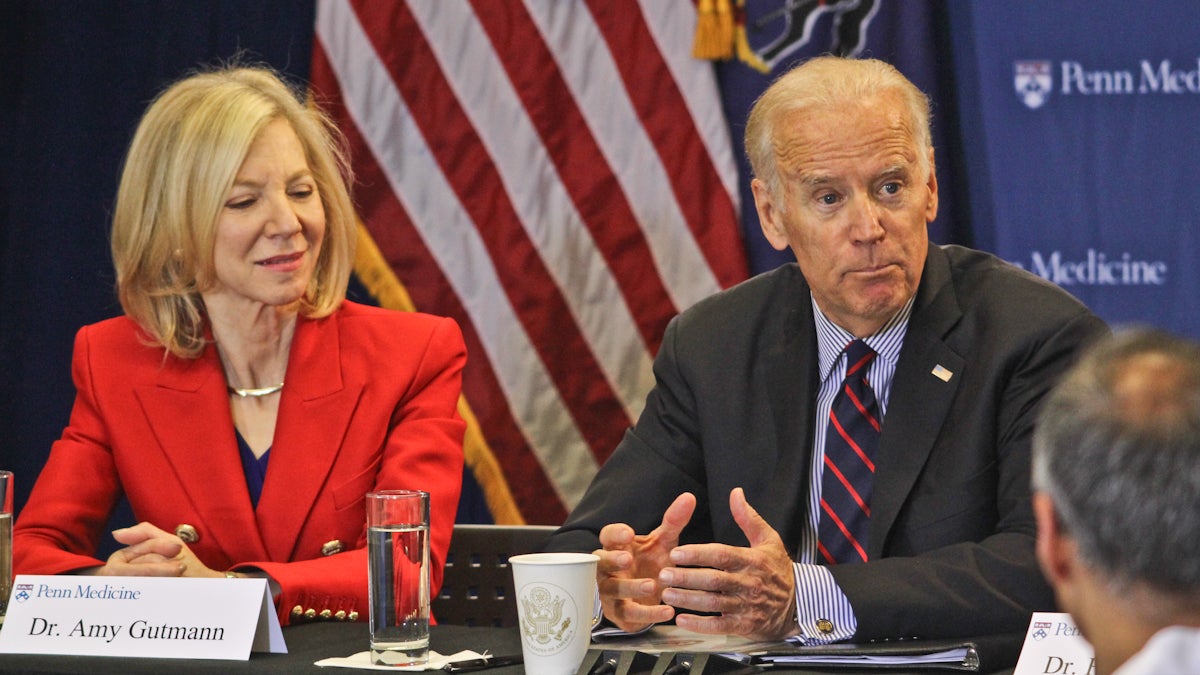In Philadelphia, Biden launches ‘moonshot’ initiative to cure cancer
Listen
Vice President Joe Biden, seated next to University of Pennsylvania President Amy Gutmann, talks about the "moonshot initiative" launched by the White House to cure cancer. Biden is spearheading the effort. (Kimberly Paynter/NewsWorks)
More than four decades after President Richard Nixon famously declared a “war on cancer,” the battles rage on. But Vice President Joe Biden is optimistic.
“We are at an inflection point in the fight against cancer,” he said Friday, during an official rollout of a new White House “moonshot” initiative to cure cancer. The effort invokes the ambition of President John Kennedy’s goal of sending an American to the moon.
During his State of the Union address, President Barack Obama appointed Biden as “mission control” of the initiative. Biden has a personal stake in the quest — he lost his 46-year-old son Beau to brain cancer last year. Since then, he has called for a national commitment to end cancer, and he has been meeting with cancer experts from around the country.
“Cure” is an ambitious goal, and it’s one that scientists and others have reframed in recent years as they learn more about how cancer works.
It’s not just one disease, for example. It’s hundreds, explained Dr. Chi Dang, head of Penn’s Abramson Cancer Center. And it means that the landscape for treatments is complex.
“Curing cancer as a general perspective, it’s really an entire space program,” said Dang. “It’s just not going to the moon. We’ve got to go Mars, we’ve got to go elsewhere. Because once we’ve cured one disease, there are different diseases.”
With advances on some fronts, including childhood leukemia, progress has lagged on other cancers. For Biden, hitting more of these targets — whether through advancing the use of genomics or immunotherapy — means breaking down bureaucracies and collaborating across disciplines and institutions.
“Whatever breakthroughs we can make in 10 years, my goal is to make sure we can do it in five years,” said Biden.
Biden pointed to the progress of researchers at Penn, for example, in the field of immunotherapy, an approach that was not on the horizon during Nixon’s call to action.
“We’re on the cusp, you’re on the cusp,” he said.
For many scientists and researchers, the White House’s push for sustained government support for research is also encouraging.
The budget for the National Institutes of Health, the main agency that publicly funds the basic research needed for these advancements, has been declining over the last decade. That shifted with the most recent 2016 budget, which included a modest increase.
“I think it’s a new day for cancer researchers,” said Jon Retzloff, with the American Association for Cancer research. “We probably only know 20 percent of the information we need to know to really take on these diseases like we need to.”
Back at Penn, Biden stressed the initiative is not about a top down, centralized White House program.
“My hope is to be a catalyst,” he said, adding that it’s going to take collaboration on all fronts. “This is not an NIH program per se, this is not a federal initiative per se. This is using all the assets in the capacity of the federal government.”
And it’s an effort he plans to extend well beyond his remaining months in office.
WHYY is your source for fact-based, in-depth journalism and information. As a nonprofit organization, we rely on financial support from readers like you. Please give today.

